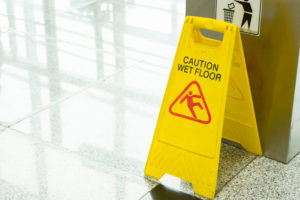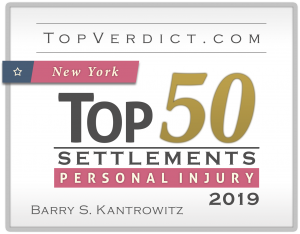
If you slipped and fell in a mall or place of business and were badly hurt in the process, who is liable for the damages? Shopping injuries are more prevalent than you might imagine given the various hazards lurking around every corner. Whether another patron tracked rainwater inside, a chipped tile created an uneven flooring surface or stair treads were missing – the potential risks are seemingly endless. Slip and fall accidents in shopping centers, malls and retail establishments raise important legal questions for victims.
If you or a loved one has been injured in a slip and fall in a department store or retail business in New York or New Jersey, you may be entitled to legal compensation. In some cases, a lawsuit is the most effective way to ensure victims receive reparations for their medical bills, lost income, and other losses.
At Kantrowitz, Goldhamer & Graifman, we leverage a combined 45 years of experience handling premises liability claims of all types, including slip and fall accidents in shopping malls and other places of business. Our knowledgeable personal injury lawyers serve residents throughout New Jersey and New York who need expert legal advocacy. To discuss your case with KGG, reach out to our Bergen County or Rockland County law offices today for a private consultation.
Shopping mall slip and fall accident liability
All retail establishments, whether big-name department stores, outdoor shopping centers or small mom-and-pop outlets are under legal obligation to ensure their premises are reasonably safe for customers. Both New Jersey and New York state law impose a duty on property owners and leases to take reasonable measures to assure their patrons are protected from foreseeable harm. In layman’s terms, this means keeping the grounds in good condition, and making sure customers are warned about potential dangers that could cause injury.
If the owner or occupier knows or should reasonably should know about a potential hazard and takes no steps to fix the problem or caution patrons, victims may cite negligence as a cause of action.
The injured person must prove negligence on the part of the person or entity who managed the property in order to recover legal damages. To establish negligence it must be shown that the defendant breached a duty of care by:
- Creating a hazardous condition
- Having actual or constructive notice of an unsafe condition but failing to correct the problem
- Having actual or constructive notice of a dangerous condition but failing to warn customers
In slip and fall accidents where the notice of a dangerous condition is under contention, the plaintiff must demonstrate that the hazard existed for a reasonable length of time so that the defendant had an opportunity to discovery and address the issue.
Proving liability in a shopping center slip and fall accident can be a challenging task, which is why it’s imperative to enlist the services of a seasoned attorney.
Who can be sued for damages?
Responsibility for general maintenance or negligence may rest with several parties, depending on the location and circumstances of the slip and fall. Security reports, video surveillance, photographs of the accident scene, witness depositions and other investigations are used to show that a duty was breached, and the plaintiff’s injuries were a direct result of this negligence.
Our slip and fall lawyers can identify at-fault parties, which may include:
- Shopping mall or store owner
- Third-party maintenance company
- Management company of the shopping center
- Retailers who lease the store space
Larger shopping malls and retail outlets often contract out their maintenance to third party companies, which are responsible for maintaining entry ways, walkways, common areas and parking lots. Regardless if your accident happened in a food court, a dressing room, or a public restroom, the attorneys at Kantrowitz, Goldhamer & Graifman will work diligently to achieve maximum compensation.
Slip and fall escalator injuries
Escalators are common installations in metropolitan shopping centers throughout New York and New Jersey. Escalator accidents can lead to debilitating injuries, from broken bones and torn ligaments to traumatic brain injury. Catastrophic injuries are not uncommon in escalator falls given the significant height involved. If an escalator has been improperly maintained and a defect or malfunction, such as a sudden stop or jerk, is the cause of a foreseeable slip and fall injury, it is probable that the victim will have a solid claim for damages. Our legal team will collect the evidence needed to establish at-fault parties so that our clients can seek justice and fair compensation.
Helping residents in Bergen County, NJ and Rockland County, NY
Fall accidents in shopping centers, malls and retail stores can leave victims with severe physical disabilities costing hundreds of thousands of dollars. Our attorneys collaborate with veteran investigators, medical experts and economic planners, and aren’t intimidated by commercial defendants with deep pockets.
We offer candid answers to your questions and sage legal advice. Call our offices today to schedule a no-obligation with slip and fall lawyers at Kantrowitz, Goldhamer & Graifman, P.C.
Additional Resources:
- US Law, Retail, Restaurant, and Hospitality Guide to New York Premises Liability http://www.uslaw.org/files/Compendiums2014/Retail/New%20York_Retail_Compendium_of_Law_2014.pdf
- National Legal Research Group, New Jersey Statutes of Limitations https://www.nlrg.com/hs-fs/hub/79400/file-15662842-pdf/docs/nj_statutes_of_limitations.pdf/documents_attorney_writing_samples/nj_statutes_of_limitations.pdf






